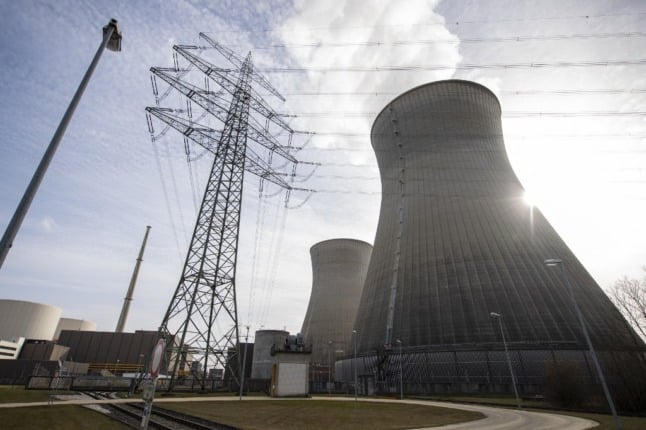With energy prices already on the rise and tensions higher than ever between Europe and key gas supplier Russia, the closure of the plants in Brokdorf, Grohnde and Gundremmingen could well tighten the squeeze.
The move will halve remaining nuclear capacity in Germany and reduce energy output by around four gigawatts — equivalent to the power produced by 1,000 wind turbines.
READ ALSO: Why Germany’s nuclear exit is posing tough questions about its energy future
Protests over the Fukushima nuclear disaster in 2011 prompted former chancellor Merkel to set the wheels in motion for abandoning nuclear power just over 10 years ago.
Germany is planning to completely wind down atomic energy by the end of 2022, when it will shut its final three plants in Neckarwestheim, Essenbach and Emsland.
But with energy prices soaring across Europe, the timing of the plans coming to fruition could hardly be worse.
Europe’s reference gas price, Dutch TTF, hit 187.78 euros per megawatt hour in December — 10 times higher than at the start of the year — and electricity prices are also soaring.
The spike has been fuelled by geopolitical tensions with Russia, which supplies one third of Europe’s gas.
Western countries accuse Russia of limiting gas deliveries to put pressure on Europe amid tensions over the Ukraine conflict.
Moscow also wants to push through the controversial Nord Stream 2 pipeline, set to ship still more Russian gas to Germany.
READ ALSO: German regulator suspends Nord Stream 2 approval process
Price hikes
The end of nuclear power in Germany will likely push prices up even further, according to Sebastian Herold, a professor of energy policy at the Darmstadt University of Applied Sciences.
“In the long term, the hope is that an increase in renewable energy will balance things out, but this will not be the case in the short term,” he told AFP.
Until Germany can really ramp up renewables, it will remain dependent on fossil fuels to plug the gap left by the nuclear exit.
“This will make Germany more dependent on natural gas overall, at least in the short term, and thus also a little more dependent on Russia,” Herold said.
The transition may also take longer than Germany would like, with progress on renewables slowed in recent years by opposition to energy infrastructure projects.
The proportion of energy generated by renewables is expected to fall in 2021 for the first time since 1997 — to 42 percent, compared with 45.3 percent in 2020.
As well as driving up prices, the nuclear plant closures will also remove a key source of low-carbon energy in a country that is already struggling to meet ambitious climate goals.
The new coalition government under Social Democrat Olaf Scholz has pledged to bring forward Germany’s planned coal exit to 2030 and wants Germany to generate 80 percent of its electricity from renewables by the same year.
Second thoughts?
But Robert Habeck, the co-leader of the Green party and head of a newly created super-ministry for the economy and climate, admitted this week that Germany is already on course to miss its climate targets for 2022 and probably also 2023.
Other EU countries, including France, are continuing to push nuclear energy and campaigning for it to be included on the EU’s list of sustainable energy sources eligible for investment.
Even in Germany, public opinion towards nuclear seems to be softening.
In a recent YouGov survey for the Welt am Sonntag newspaper, around 50 percent of Germans said they were in favour of reversing the planned nuclear shutdown due to the recent sharp rise in energy prices.
Monika Schnitzer, a member of the German Council of Economic Experts, told the Rheinische Post newspaper that it would make sense “economically and ecologically” to delay the shutdown.
But the government is sticking to Merkel’s plan, with Habeck this week defending the nuclear shutdown.
Any politician calling for the reintroduction of nuclear energy “would also have to say, I would like to have the nuclear waste in my constituency,” he said. “As soon as someone says that, I will revisit the issue.”




 Please whitelist us to continue reading.
Please whitelist us to continue reading.
Member comments